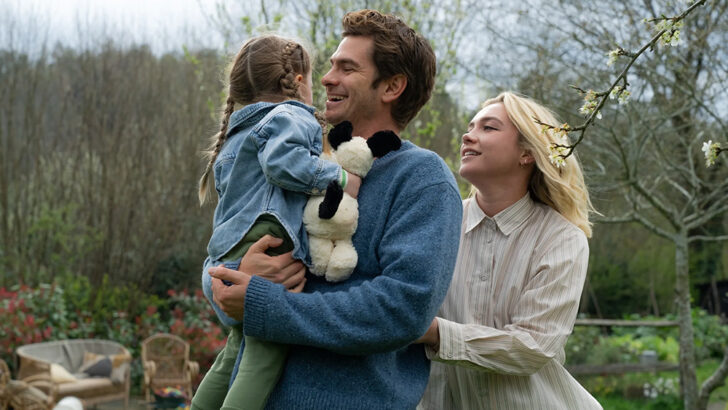We Live in Time (15) is a flashback-filled love story starring Andrew Garfield and Florence Pugh. Pugh has cancer but is upbeat about it – and indeed about everything. The film narrowly avoids being a tearjerker as she navigates her way through her medical problems.
There are some cringy scenes, most of them engineered by Garfield. His unflappable joviality In Ex-tremis I’ve always found irksome. Pugh is more endearing in her disquisitions on transience, preg-nancy, intimations of mortality.
The film is heart-warming in that overweeningly feelgood way that often makes me feel anything but good. John (Brooklyn) Crowley explores the tragi-comic relationship with honourable intentions but milks the pain on display, overcooking the film’s ‘embrace the moment’ message telegraphed by the title.
F.W. Murnau’s gothic horror classic Nosferatu (15) is an adaptation of Dracula that spearheaded German expressionism over a century ago. It was re-made by Werner Herzog in 1979. Robin Eggars now warms his hands (or should I say teeth) at the fire with a stunning array of blood-curdling effects and an expansion of Murnau’s characters.
Bill Skarsgard plays Count Orlock. He stalks the haunted Ellen Hutter (Lily Rose Depp) with vampiric venom. There’s a hypnotic magic about the eeriness.
Magnus van Horn’s The Girl with the Needle (15) also recalls German expressionism, its stark mono-chrome cinematography capturing the decay of post-World War II Copenhagen chillingly.
His film tells the portentous story of a pregnant girl, Karoline (Vic Carmen Sonne), who works as a wet nurse for a demonic woman (Trina Dyrholm). She runs an adoption agency fronting as a sweet shop.
Karoline’s growing fears of what might happen to her soon-to-be-born baby is the main business of this uncompromising odyssey into alienation and exploitation.
Maria Callas was arguably the greatest soprano of all time but her life was a car crash, especially after Aristotle Onassis dumped her for the widowed Jacqueline Kennedy. Pablo Larrain, who helmed a bi-opic of Ms Kennedy (Jackie) directs Angelina Jolie in Maria (R).
It’s a poignant depiction of the broken-down diva as she pops pills and fantasises, like the Norma Desmond of Sunset Boulevard, about a parade that has long since passed her by,
A Real Pain (R) is an amusing ‘buddy’ film starring Jesse Eisenberg, who also writes and directs, and Kieran Culkin. They’re two cousins embarking on a Holocaust tour of Poland.
Eisenberg is strait-laced, a happily married man with a successful career. He tries to avoid confronta-tion at all costs. Culkin is the goofy sidekick who delights in pulling people down, especially when they’re spouting socio-political cliches.
Their main interest in the tour is to visit the childhood home of Eisenberg’s grandmother. (Her actual home is used in the film).
The ‘odd couple’ trope has been deployed innumerable times in the past. Here it acquires an added dimension. The mismatched pair discover revelatory inner truths about themselves and one another against the backdrop of some of history’s grimmer back pages.


 Aubrey Malone
Aubrey Malone A scene from the film We Live in Time
A scene from the film We Live in Time